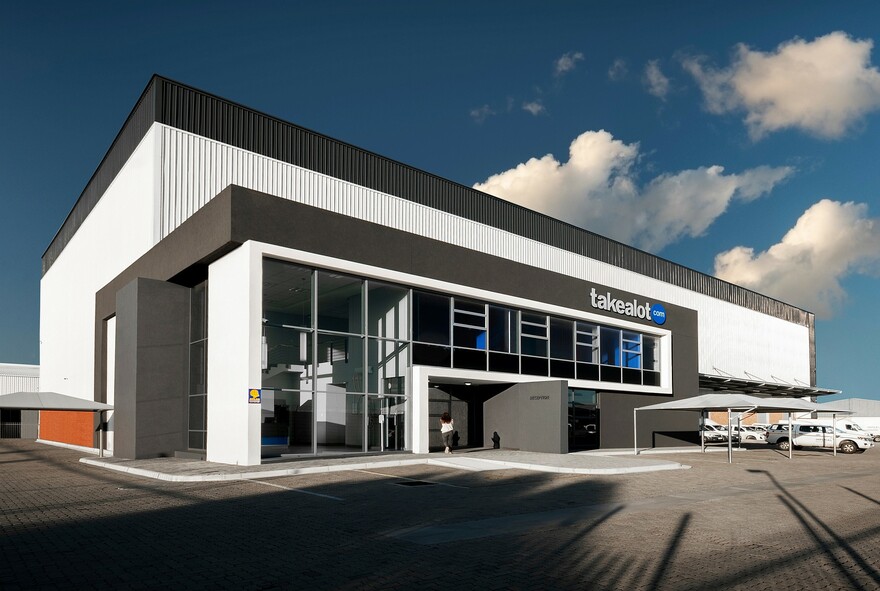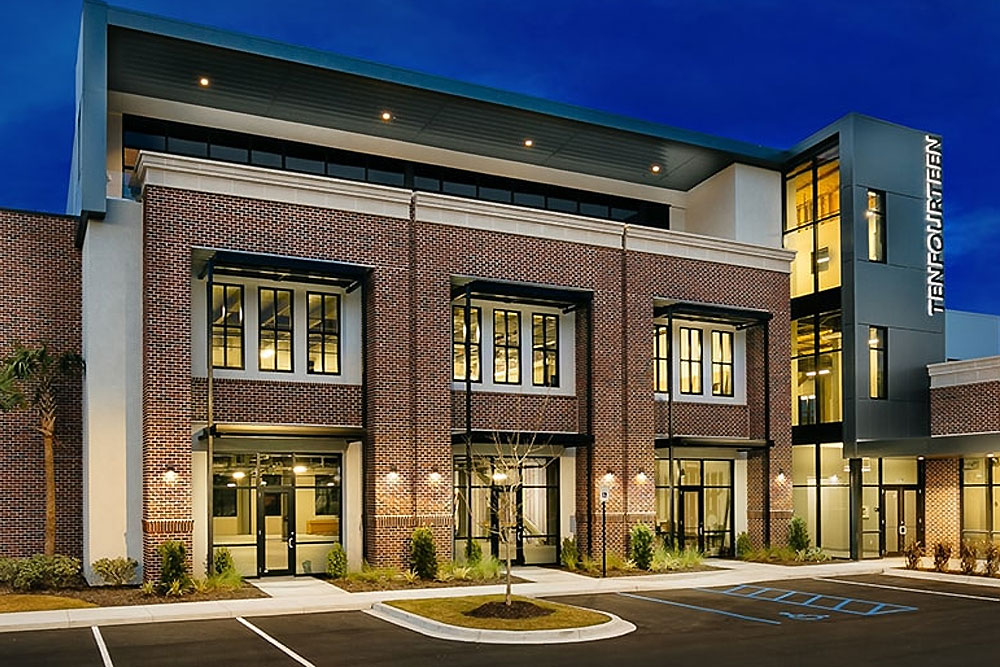Just How Commercial Architects Can Transform Your Service Space With Professional Layout Solutions
Commercial architects play a vital duty in reshaping business atmospheres. Their competence in layout can significantly improve both performance and visual appeals. By producing spaces that reflect a brand's identity, they boost operational performance and employee satisfaction. Nonetheless, the effect of their job extends beyond mere look. Recognizing the subtleties of collaboration and sustainability can cause transformative results. What certain aspects make these changes effective?
Comprehending the Role of Commercial Architects
Commercial architects play an important role in shaping service environments that are both practical and aesthetically pleasing. They specialize in making areas customized to the particular requirements of businesses, guaranteeing that every square foot is utilized successfully. These specialists incorporate elements such as spatial design, lighting, and materials to improve performance and staff member health. By teaming up with clients, industrial architects gather insights right into operational demands and brand name identification, equating these right into innovative designs.Additionally, they browse intricate building codes and zoning legislations, ensuring conformity while making the most of style potential. Their experience extends to sustainability methods, promoting energy performance and eco friendly materials in their projects. Through their innovative vision and technological expertise, commercial architects not only create attractive spaces however likewise foster atmospheres that promote cooperation and development. Inevitably, their payments significantly affect the general success and photo of a service.
Advantages of Specialist Layout Providers

Tailoring Spaces to Your Brand Identification
Customizing rooms to a brand's identity is essential for conveying its core worths and mission. Commercial architects play a pivotal duty in improving an organization's aesthetic identification via thoughtful layout options. By straightening building aspects with brand concepts, business can produce environments that resonate with clients and workers alike.
Reflecting Brand Values
Exactly how can a properly designed space symbolize a firm's core worths? Commercial architects play an important function fit environments that reverberate with a brand name's identity. By integrating elements such as shade plans, materials, and formats, they develop areas that reflect the significance of business. A tech firm may decide for open layouts and modern home furnishings to communicate development and cooperation, while a high-end brand might pick classy finishes and intimate rooms to evoke exclusivity and sophistication. Thoughtful style not just improves capability however also promotes a strong connection in between employees, customers, and the brand name. Eventually, a well-crafted setting functions as a tangible representation of a firm's mission and vision, enhancing its worths at every touchpoint.
Enhancing Visual Identification
What elements can properly elevate a brand's visual identification within a commercial space? Commercial architects play a critical function in integrating style features that resonate with a company's ethos. Color pattern, typography, and products can be strategically selected to show brand name worths while making certain visual allure. In addition, incorporating logos and brand name images into the style can create a cohesive visual narrative. Illumination style can additionally boost the atmosphere, guiding client assumptions and experiences (commercial architects). Format and furnishings selections should align with the brand's personality, whether it's modern, conventional, or ingenious. Inevitably, a properly designed business room not just draws in clients yet additionally enhances brand acknowledgment, developing a long-term impression that fosters loyalty and engagement
Enhancing Performance and Efficiency
Enhancing functionality and efficiency in industrial areas entails maximizing area utilization and making operations that streamline operations. Architects concentrate on creating layouts that lessen squandered space while facilitating smooth adjustments between jobs. This technique not only improves performance however also adds to a much more cohesive working setting.
Enhancing Room Usage
Reliable space application is an essential aspect in industrial architecture, where the layout should stabilize appearances with performance (commercial architects). Architects employ different methods to take full advantage of readily available square video while guaranteeing that each location offers a read the article distinct function. By analyzing process, website traffic patterns, and user needs, architects can produce layouts that improve both employee efficiency and client experience. Multi-functional areas, adaptable furniture plans, and maximized storage services are important elements in attaining this goal. Furthermore, including natural light and open rooms promotes a more inviting environment, more elevating the utility of the atmosphere. Inevitably, reliable area application not only enhances operational effectiveness yet additionally adds favorably to the total brand name image, making it a vital factor to consider in industrial style
Structured Operations Design
How can a well-designed process change a commercial room right into a center of productivity? Streamlined workflow style concentrates on optimizing the physical format and operational processes within a business atmosphere. By tactically setting up workstations, conference areas, and resources, architects can get rid of unnecessary motion and enhance collaboration. This thoughtful design lessens distractions and helps with communication, allowing staff members to concentrate on their tasks much more effectively. Additionally, integrating innovation into the workflow can further automate procedures, lowering time invested in routine jobs. As a result, businesses experience boosted worker morale and check this site out raised outcome, producing a dynamic ambience that cultivates technology. Eventually, purchasing structured workflow layout not just boosts performance however also positions a business area for sustainable development and success.
Promoting Collaboration Via Design
Modern work spaces commonly prioritize private productivity, the style of business spaces progressively emphasizes partnership as an essential driver of technology and group cohesion. Architects play an essential function in developing atmospheres that foster interaction among workers. Open up designs, multifunctional rooms, and strategically placed common locations motivate spontaneous conversations and brainstorming sessions.Incorporating aspects such as movable furniture and versatile conference areas allows teams to reconfigure rooms based on their collective needs. Additionally, incorporating modern technology, like interactive white boards and video clip conferencing devices, boosts the capacity to communicate successfully, despite location.Natural light and biophilic design aspects likewise add to an extra welcoming ambience, advertising comfort and wellness, which are important for efficient teamwork. By concentrating on these aspects, commercial architects can create dynamic environments that not only improve partnership but also drive general service success.
Lasting Style Practices in Commercial Architecture

Instance Studies: Successful Makeovers by Commercial Architects
The execution of sustainable design practices has not just improved the approach to commercial design however has actually likewise brought about impressive transformations in different organization rooms. One remarkable instance is the redesign of a technology firm's head office, where architects incorporated all-natural light and environment-friendly wall surfaces, causing boosted staff member health and performance. This makeover lowered power prices by 30% and boosted the business's public image.In one more instance, a retailer went through a total overhaul, using recovered materials and energy-efficient systems. This not only attracted eco-conscious consumers but also increased foot traffic by 25%. A third instance entailed a business office that accepted an open-plan design with flexible workspaces, cultivating cooperation among teams. The architects' concentrate on producing a dynamic and versatile atmosphere significantly improved employee complete satisfaction. These study exhibit how commercial architects can develop impactful areas that align with service goals and sustainability initiatives.
Often Asked Questions
Just How Much Do Commercial Style Provider Usually Expense?
The expense of business design services varies commonly, usually ranging from $100 to $250 per hour. Factors affecting prices consist of project intricacy, location, and the engineer's experience, making it vital for businesses to acquire comprehensive price quotes.
What Sorts Of Organizations Benefit The Majority Of From Commercial Architects?
Various services, consisting of retail, hospitality, and business offices, considerably take advantage of commercial architects. These specialists improve functionality, aesthetics, and brand identification, making sure areas are optimized for client involvement and staff member efficiency, inevitably cultivating organization growth.
The length of time Does a Business Design Project Generally Take?
The timeline for a commercial design job generally ranges from a number of weeks to numerous months. Factors influencing duration include job complexity, regulative authorizations, and cooperation amongst stakeholders, all of which can impact overall conclusion time.
Can I Hire a Commercial Architect for Remodellings Only?
Yes, employing an industrial designer for remodellings is practical. Several architects specialize in remodelling jobs, supplying knowledge in enhancing existing spaces while adhering to regulations and enhancing performance, aesthetics, and total worth of the organization setting.
What Credentials Should I Try to find in an Industrial Designer?
